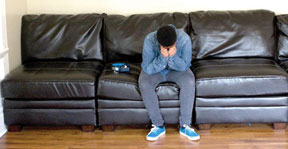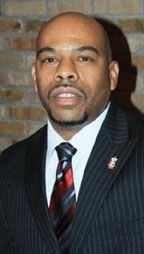
 Aging out: Life after foster care
Aging out: Life after foster care
Angelicah Malone said school wasn’t really an option for her because the stability wasn’t there. She doesn’t remember any of middle school and when she was placed in Los Angeles foster care, she started to skip class. The foster parent she lived with barely supervised her, she said. Her siblings are scattered across the city. (Jae C. Hong/Dallas Examiner)
By Mike McGee, Special to the NNPA from the Dallas Examiner
For many youth across the nation, the transition into adulthood comes with questions. Questions such as: Where will they go to college or where they will get their first “real” job?
Yet, for the youth raised through the foster care system the questions may be grimmer. Challenges about how they will gain needed life skills and where will they soon call home are more difficult for the foster teens moving into an adult world. A large number of the young people who deal with such is-sues while on the verge of being pushed out of the foster care system are African American.
In 2013, 24 percent of the U.S. foster care children were Black, double the percentage of African American children in the U.S. population, according to Child Welfare Information Gateway.
The report also showed that Black youth are often in foster longer. And though the number of African Americans entering the system has decreased by 10 percent in the past 10 years, the percent of youth who stay until they age out has increased. Those youth are more likely to face homelessness, unemployment and incarceration once they leave the foster care system.
“When you look at the statistics that show the performance and success ratio of young adults who age out of foster care at age 18, it’s not very indicative of the service that they have been given by the foster care system since whatever time they came into it,” said Deborah Dennis as she explained the critical need for continuing attention for those who have aged out of the system.
Dennis, CEO of the WREM Literacy nonprofit program in Prairie View, said her organization won the contract for a Supervised Preparation for In-dependent Living program in September of 2014 to provide such attention. WREM SPIL offers a supervised independent living facility to house foster care young adults between the ages of 18 and 22 who were under state conservatorship on their 18th birthday.
“When they age out, over half are unemployed. Twenty percent of them are homeless,” she said of the youth her group assists. “Some of them are so bruised by having been in foster care for so long that when they age out they don’t want anything else to do with the system.”
Only 3 percent of young people leaving the system pursue higher education, she added. Students get into SPIL by first applying for a Supervised In-dependent Living program through PALS worker, case-worker or aftercare worker.
The SPIL program strives to keep students in higher education while allowing them to function independently.
“We give them a $300 a month stipend to pay housing, to pay child care, so they’re making, net, what you would make on a minimum wage job because we expect all those other expenses – like housing, utilities, child care – and the only thing we ask in return is you attend higher education,” Dennis stated. “The goal is to help you get a vocation so you can earn money. [WREM SPIL’s] goal is to expose you to college and then, if you can’t be successful, then we’ll fall back and try other things. The premise is, ‘Well, if these students are going to end back up on the system anyway let’s spend some money developing them to help them rise above the struggle, so to speak.’”




Be the first to comment